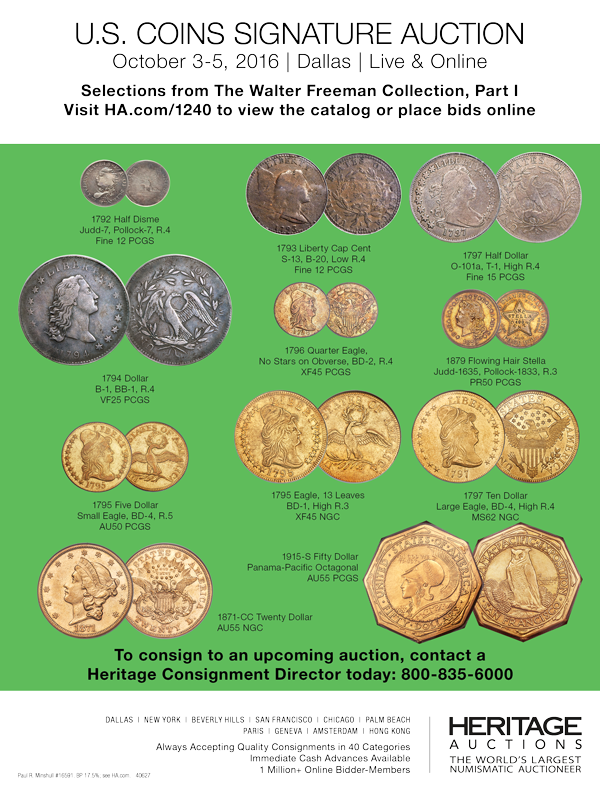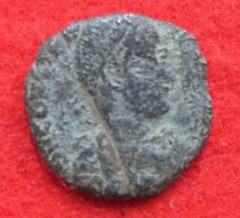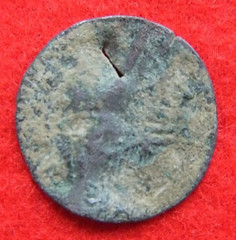
PREV ARTICLE
NEXT ARTICLE
FULL ISSUE
PREV FULL ISSUE
ROMAN COINS FOUND IN RUINED JAPANESE CASTLESeveral E-Sylum readers forwarded
versions of this story about Roman coins being found by
archeologists in Japan. I first came across the story in an
article on CNN. -Editor
When archeologist Hiroyuki Miyagi heard that a bunch of ancient Roman and Ottoman coins had been unearthed from the ruins of an old castle in Okinawa, he initially thought it was a hoax. "I couldn't believe they'd found coins from the Roman empire in Kasturen castle," Miyagi, who works at Okinawa International University, told CNN. "I thought that they were replicas that had been dropped there by tourists." Since 2013, a team of archeologists from Uruma city's local Board of Education has been excavating Katsuren castle -- a UNESCO world heritage site -- which is located in Okinawa, Japan's southernmost prefecture.
"I'd come to analyze artifacts like Japanese samurai armor that had been found there when I spotted the coins," Tsukamoto, told CNN. "I'd been on excavation sites in Egypt and Italy and had seen a lot of Roman coins before, so I recognized them immediately." The coins were later submitted to Miyagi, who examined them using X-ray technology. "You can see the engravings on the coins clearer when you use X-rays," Miyagi, told CNN.
It's hard to tell where exactly these coins came from, Masaki Yokou, a spokesperson from Uruma city's Board of Education, told CNN. Dubbing it a "strange and interesting find," Yokou explained that Katsuren castle was known to have trade relations with China and other neighboring Asian countries in the 14th and 15th century. "We don't think that there is a direct link between the Roman empire and Katsuren castle, but the discovery confirms how this region had trade relations with the rest of Asia," Yokou, told CNN. Both Yokou and Tsukamoto speculated that the coins ended up in Japan after passing through different trade routes that linked the West to Asia. Miyagi, who called the discovery "remarkable," said the next step was to try and find out how exactly these coins ended up in Japan. To read the complete article, see: This article from The Independent has a
video interview with archeologist Hiroyuki Miyagi. -Editor
The four copper coins were retrieved from soil beneath Katsuren Castle on Okinawa Island, and were originally thought to be a hoax before their true provenance was revealed. The designs on the coins are difficult to decipher as they have been eroded over time, but x-ray analysis revealed several of the relics bore the image of Emperor Constantine I. Since excavation on the site began in 2013, researchers have also found a further six coins which may be dated back to the Ottoman Empire in the late 17th century. To read the complete article, see: Phil Mernick forwarded an article from MSN News, He writes: I don’t think the Romans knew of the existence of Japan and the coins could have got there any time between the 4th and the 17th century (when I think it went out of use), but it makes an interesting story. They also found some Ottoman coins from the 1680s. This would appear to be after the castle ceased to function as a castle so maybe the grounds were used by a foundry that imported scrap copper for reuse. Thanks also to Stephen Pradier and Dick Hanscom
who forwarded a Daily Mail article, and Peter
Huntoon who forwarded a Smithsonian article. -Editor
To read the Daily Mail article, see: To read the Smithsonian article, see:  Wayne Homren, Editor The Numismatic Bibliomania Society is a non-profit organization promoting numismatic literature. See our web site at coinbooks.org. To submit items for publication in The E-Sylum, write to the Editor at this address: whomren@gmail.com To subscribe go to: https://my.binhost.com/lists/listinfo/esylum All Rights Reserved. NBS Home Page Contact the NBS webmaster 
|

